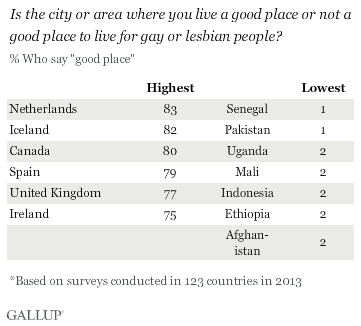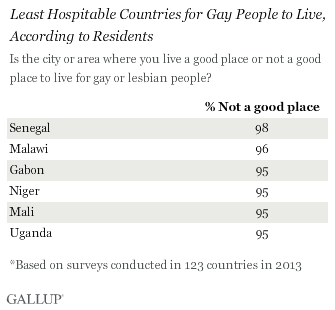WASHINGTON, D.C. -- Nearly three in 10 adults (28%) across 123 countries in 2013 say their city or area is a "good place" for gay or lesbian people to live, but hospitable attitudes range widely from as high as 83% in the Netherlands to as low as 1% in Pakistan and Senegal.

It is important to note that the global average and the country rankings do not include data from more than a dozen countries where the question is too sensitive to be asked: Egypt, Morocco, Saudi Arabia, Jordan, Iran, Nigeria, Bahrain, Bhutan, Iraq, Kuwait, Tajikistan, Turkmenistan, United Arab Emirates, Uzbekistan, and Yemen.
Of the countries where three in four or more residents feel their area is hospitable to gay and lesbian people, all but Canada are in Europe, and all but Ireland (75%) have marriage equality laws. In Ireland, voters will cast their ballots on a referendum in 2015, and the country could join their European neighbors in allowing marriage equality by next year.
The Netherlands, where more than eight in 10 residents say their local communities are good places for gays or lesbians to live, was also the first country in the world to legalize same-sex marriage in 2001. As of 2013, Iceland (82%), Canada (80%), Spain (79%), the United Kingdom (77%), and Belgium (74%) had legalized gay marriage.
By contrast, in many of the countries where the residents are least likely to feel their city or area is a "good place," it is illegal to be openly gay. For example, "an improper or unnatural act with a person of the same sex," as Senegal's anti-gay law dictates, can be punished with up to five years in prison and fines of up to $3,000. Laws that allow for the imprisonment of gay and lesbian people are also on the books in Pakistan -- where 1% say their area is a good place for gay people to live -- Uganda (2%), Ethiopia (2%), and Afghanistan (2%).
Residents of African Countries Most Likely to Say "Not a Good Place"
Of the countries or areas where residents are most likely to say their city or area is "not a good place" for gay and lesbian people, nearly all were African nations, where same-sex relationships are still largely taboo. This sentiment is nearly universal in Senegal (98%), Malawi (96%), Gabon (95%), Niger (95%), Mali (95%), and Uganda (95%). With passage of the Anti-Homosexuality Act in Uganda, for example, same-sex intimacy was punishable by life in prison. This, however, was recently struck down by a Ugandan court.

The perception that their local communities are not hospitable to gay and lesbian people is widely shared throughout the African sub-continent. South Africa may be the sole exception, with nearly half of the population (49%) saying their community is a good place for gay or lesbian people to live, but a slight majority (51%) says it is "not a good place." This comes after the nation was the first and only in Africa to legalize same-sex marriage in 2006.
Bottom Line
As much of Africa continues to struggle with human rights for all residents, few in the region believe their communities are good places for gay or lesbian people. Anti-gay sentiment is apparent.
"These latest findings show that for many lesbian, gay, bisexual, or transgender (LGBT) people around the world, being open about their sexual orientation or gender identity likely comes with substantial risk," said Gary Gates, a Williams Distinguished Scholar at the Williams Institute, UCLA School of Law. "This helps to explain why legal and social change toward greater acceptance toward LGBT people can be so elusive in regions of the world like much of the African continent. When the vast majority of residents believe a country is not a good (and likely safe) place for gay and lesbian people, LGBT visibility remains low and progress toward a more supportive climate can be painfully slow."
Meanwhile, residents of wealthier, Western countries where gays and lesbians continue to thrive, both legally and culturally, are more likely to say their communities are good places for them to live. In many places, growing acceptance of same-sex relationships has resulted in greater legal rights and protections for gay and lesbian people, which in turn may advance the idea that such communities are good places for them to live.
Data on this item are available in Gallup Analytics. For complete data sets or custom research from the more than 150 countries Gallup continually surveys, please contact us.
Survey Methods
Results are based on telephone and face-to-face interviews with approximately 1,000 adults in each country, aged 15 and older, conducted in 2009 and 2013. For results based on the total sample of national adults, the margin of sampling error ranges from ±2.1 percentage points to ±5.6 percentage points at the 95% confidence level. The margin of error reflects the influence of data weighting. In addition to sampling error, question wording and practical difficulties in conducting surveys can introduce error or bias into the findings of public opinion polls.
For more complete methodology and specific survey dates, please review Gallup's Country Data Set details.


